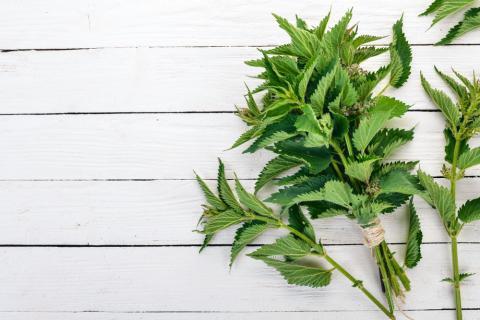
Chronic stuffy sinuses may be due to allergies, diet, infection, or structural issues in the airways. More than one of these may be at play for some folks. When the mucus is clear, the issue may be related to allergies, diet, or chronic low-level infection. Acute infections are most often viral, which means that antibiotics won’t work. Sinus issues may be bacterial, in which case antibiotics may help if the bacteria aren’t resistant. Chronic infections may be with a virus, with bacteria or even with a fungus. In fact, infection with fungi such as Aspergillus is a common but often overlooked reason for chronic sinus issues. Fungal infections can be stubborn, and some of the oral medications used may have nasty side effects.
When your sinus congestion just won’t let up…
1. Avoid mucus forming foods.
These include cold foods, sweet foods, fruit juice, refined flour, dairy, eggs, oily foods, and fatty meats. Some level of mucus is important for protecting the sinus passages, but when you already have five pounds of snot in your head, the last thing you want to do is make it worse.
2. Eat supportive foods.
These include mucus-clearing foods such as scallions; celery; turnips; radishes; alfalfa sprouts; pumpkin; button mushrooms; seeds such as sesame, pumpkin, and sunflower; and specific grains like organic corn, rye, and amaranth. Also on the list are immune-supporting foods and those that are anti-microbial (bacteria, viruses, etc.!), like garlic, onions, ginger, and mushrooms. Easy-to-digest but nutrient-dense foods are also helpful…so more cooked veggies and fewer raw (especially seasonally), soups, stews, smoothies, and such. If digestion is weak or someone eats a lot of hard-to-digest foods, mucus levels may noticeably increase. I see this in myself frequently…when my digestion is sub-par, my sinuses and lungs get much phlegmier. This a link that has long been known in traditional medicine.
3. Use botanicals for support.
Herbs and mushrooms can be helpful for chronically problematic sinuses. They are best used in the context of a supportive diet and other approaches. Here are some of my favorites for myself and for clients:
- Nettles (Urtica dioica) are drying, which is helpful for congestion. Nettle leaf targets many other aspects of “allergic rhinitis,” nasal stuffiness, and other upper respiratory symptoms caused by allergies. Though tea is my favorite form, a liquid extract will also help reduce the release of inflammatory chemicals like histamine and Cox-2. Nettle leaf is also astringent, helping to “tighten up” mucus membranes and make them less “leaky” and making it more difficult for unwanted bugs to establish infection. Take breaks when using nettle leaf, as it is very drying.
- Gumweed (Grindelia squarrosa & other species) is a common plant throughout North America and many other places in the world. It likes to grow in disturbed areas where the normal flora has been essentially bulldozed. Gumweed is easy to identify. While it’s commonly used for dry, sticky mucus, it also works well for heavy duty snot! It’s also active against bacteria, fungi, and viruses. Gumweed has antihistamine activity as well. I prefer to use the sticky flowers and flower buds as a liquid extract, but the leaves and flowers also work as a tea.
- Reishi (Ganoderma lucidum) is a mushroom that has few contraindications and is a fantastic immune-building tool. It is not an immune stimulant like echinacea—rather it works slowly to improve the function of multiple immune system components, helping folks to better resist infections. A strong mushroom decoction is best for this. Reishi reduces inflammation and has been a great ally in reducing seasonal allergies for my clients. A decoction or liquid extract works for these. Reishi is also a digestive bitter tonic. Improved digestion translates to less mucus formation in the body.
- Elderflower (Sambucus species) is an immune-stimulating, anti-inflammatory herb that is helpful for allergies as well as viral or bacterial infection. Tea or liquid extracts are great for chronic sinus congestion. We have lots of elder growing here just outside of Durango and it’s an important early summer ritual for me to go out and gather the flowers.
- Chinese skullcap (Scutellaria baicalensis) is a multifunctional herb that strengthens a weak immune system while reducing inflammatory responses through multiple pathways…blocking histamine and other inflammatory chemicals, for example. It’s active against bacteria and is one of my favorite herbs for chronic fungal infections. Chinese skullcap is also astringent, helping improve the integrity of the mucus membrane lining. Like Reishi, Chinese skullcap acts as a digestive bitter, helping in yet another way to reduce excess mucus production.
- Thyme (Thymus vulgaris) is a strongly anti-microbial plant with broad activity against viruses, bacteria, and fungi. It’s also easy to obtain…most grocery stores have thyme. Thyme also helps reduce congestion while stimulating an immune response. It’s tasty as a tea with a bit of lemon and a small amount of raw, local honey.
- German Chamomile (Matricaria recutita) is a solid anti-inflammatory herb and its gentle relaxing properties may help your annoyance with the stuffy sinuses. Chamomile is a traditional anti-allergy herb, and though some folks are actually allergic to it, this is rare. Chamomile is yet another decongestant and digestive bitter. Its relaxing properties make it a good one to try before bed. Use a liquid extract rather than the tea if you tend to visit the bathroom during the night.
4. Try essential oil steams.
Done once or twice daily, steams can help reduce congestion, reduce inflammation and even provide some anti-microbial activity. Simply heat some water, and let it cool a little so you don’t give yourself a steam burn. Add 4-6 drops of essential oil to the hot water in a bowl and breathe in the steam for 5-10 minutes. Keep a towel over your head and the bowl. I don’t use steams as standalone therapy but they go well with steps 1-3 above. For folks where the heat is actually irritating, skip the steams! Otherwise, some good oils to use include:
- Thyme (Thymus vulgaris) —Don’t use this long term, as it can start irritating the mucus membranes in your sinuses. Great for fungal, bacterial, or viral infection. Thyme is stimulating, so reserve for daytime use.
- Geranium (Pelargonium graveolens) —This is a strong anti-fungal oil with activity against bacteria as well. Plus, it smells great and is lovely for mood support, day or evening.
- Bergamot (Citrus bergamia) —This is a great-smelling, decongesting, and anti-viral oil. Use day or evening for its relaxing and uplifting effects.
- Eucalyptus (Eucalyptus globulus) —While not a great smelling oil to me, eucalyptus is a powerful anti-viral, anti-bacterial, and anti-fungal decongestant. It’s stimulating, so use it during the day. And, while I’m generally not listing contraindications* for all the botanicals in this article, do not use eucalyptus in small children. *Always learn the possible contraindications for herbal products before use.
- Lavender (Lavandula angustifolia) —This oil is soothing for your mind state as well as your mucus membranes, reducing irritation in both cases. It’s also pretty broadly anti-microbial and has some mild decongesting properties.








